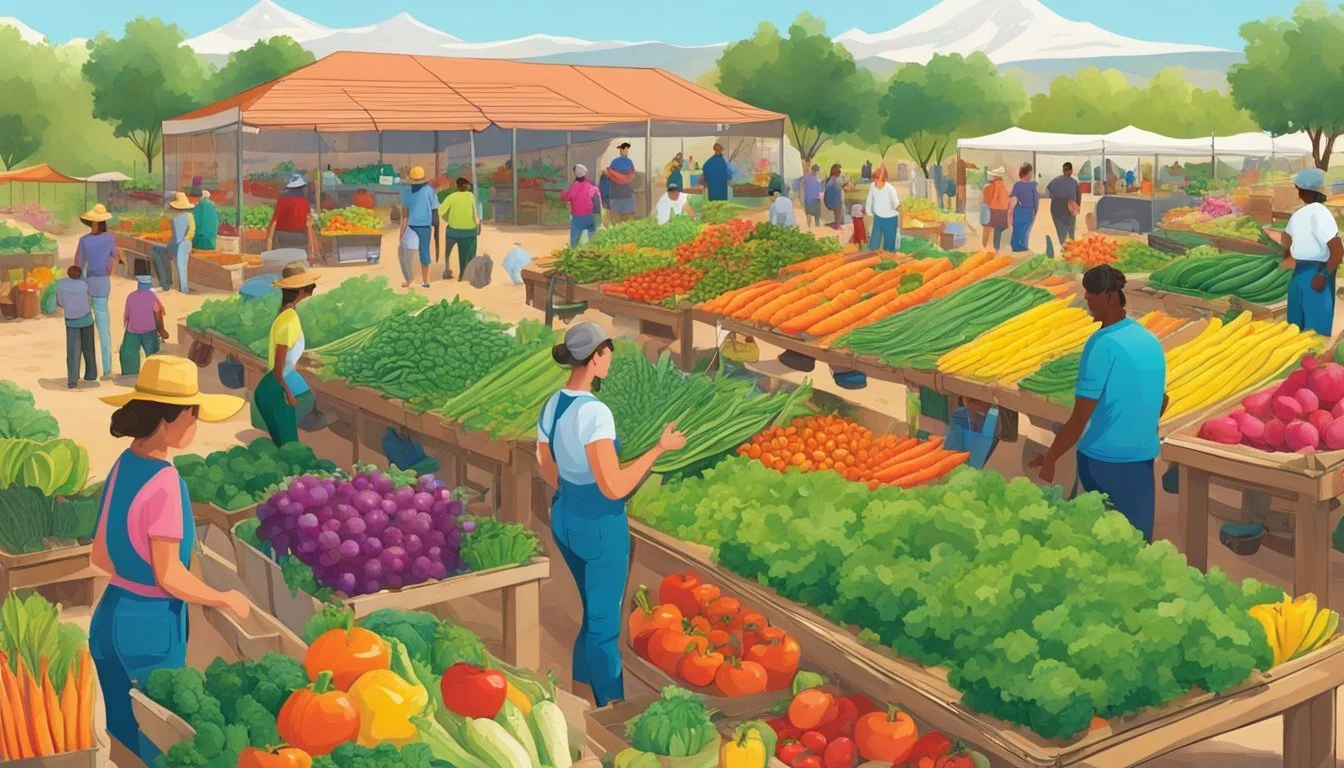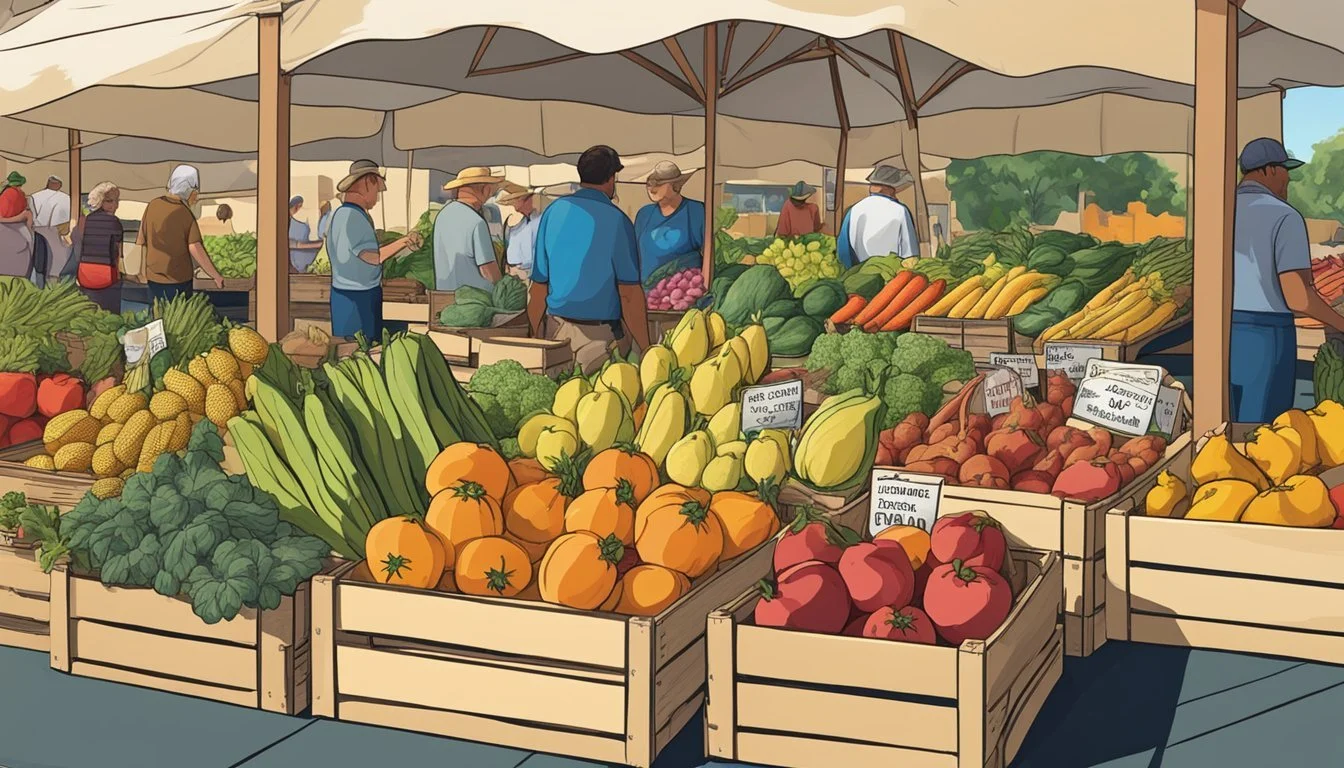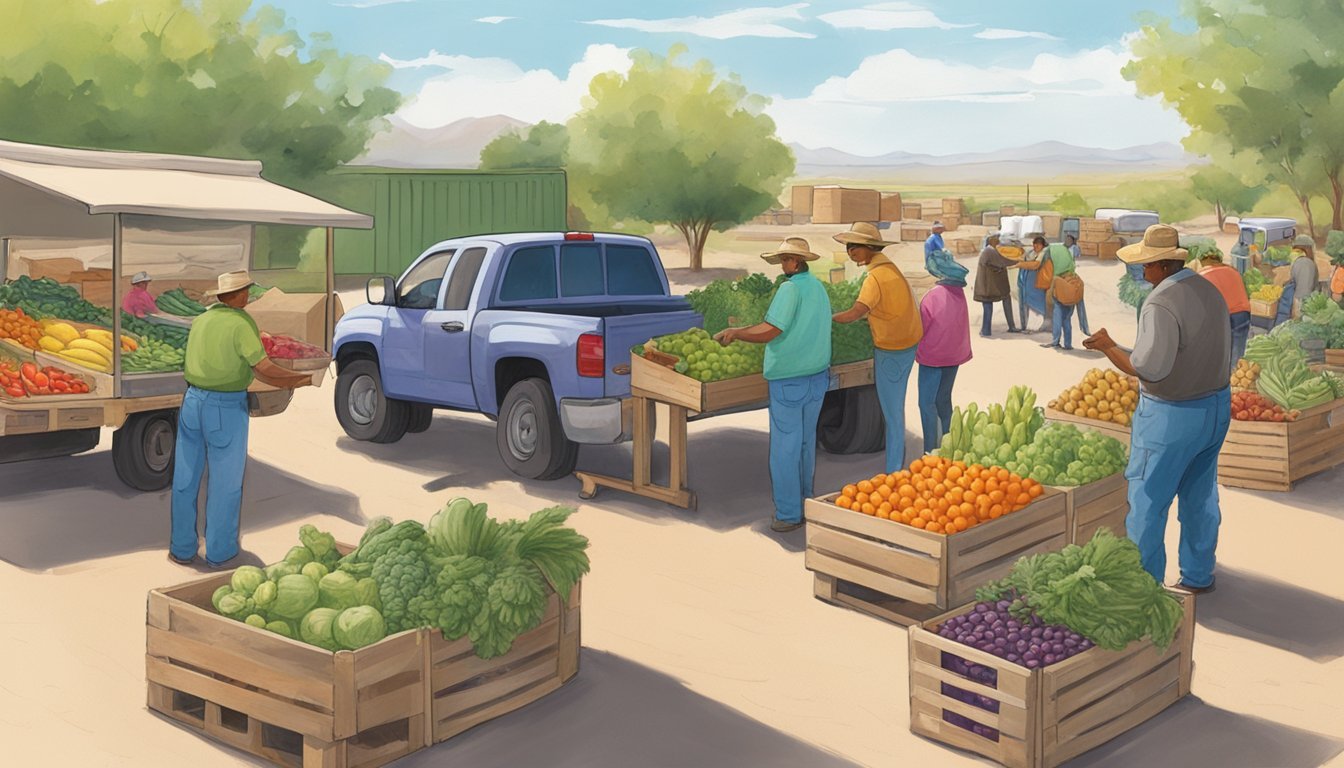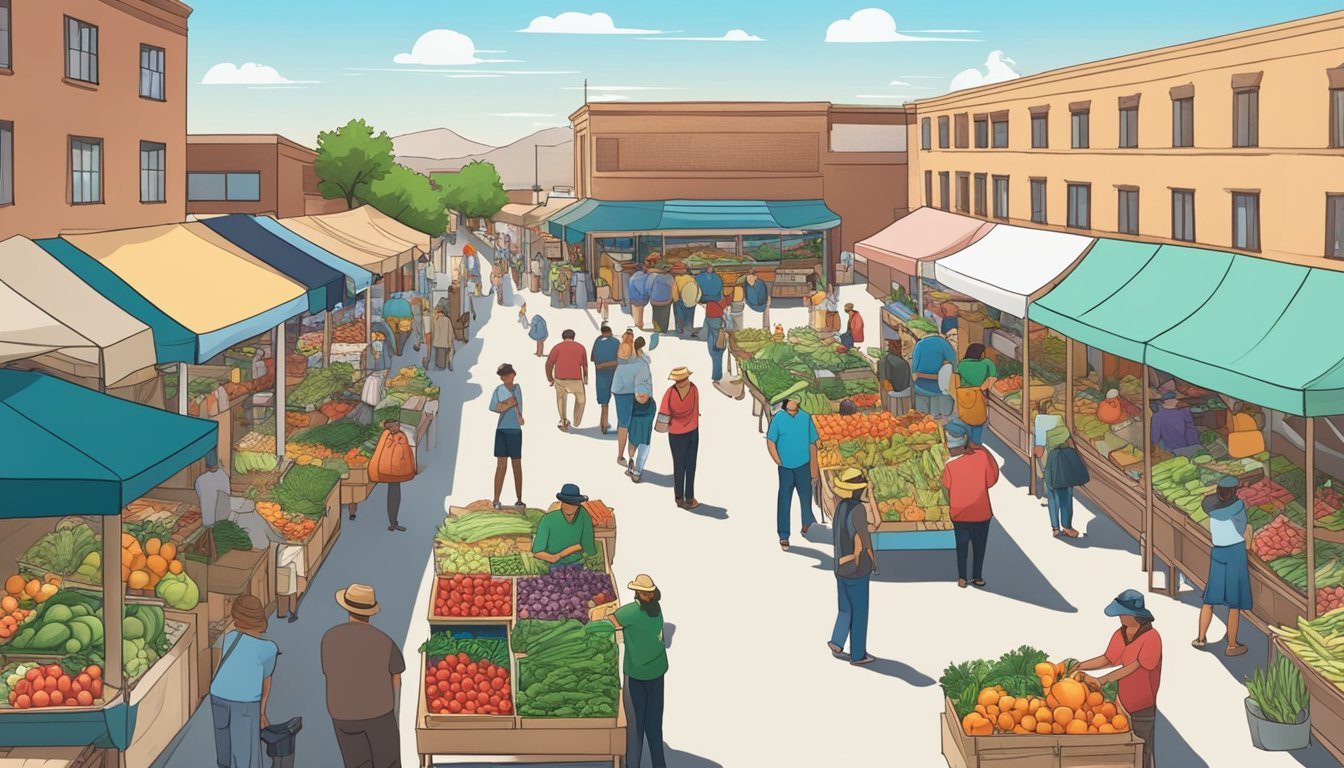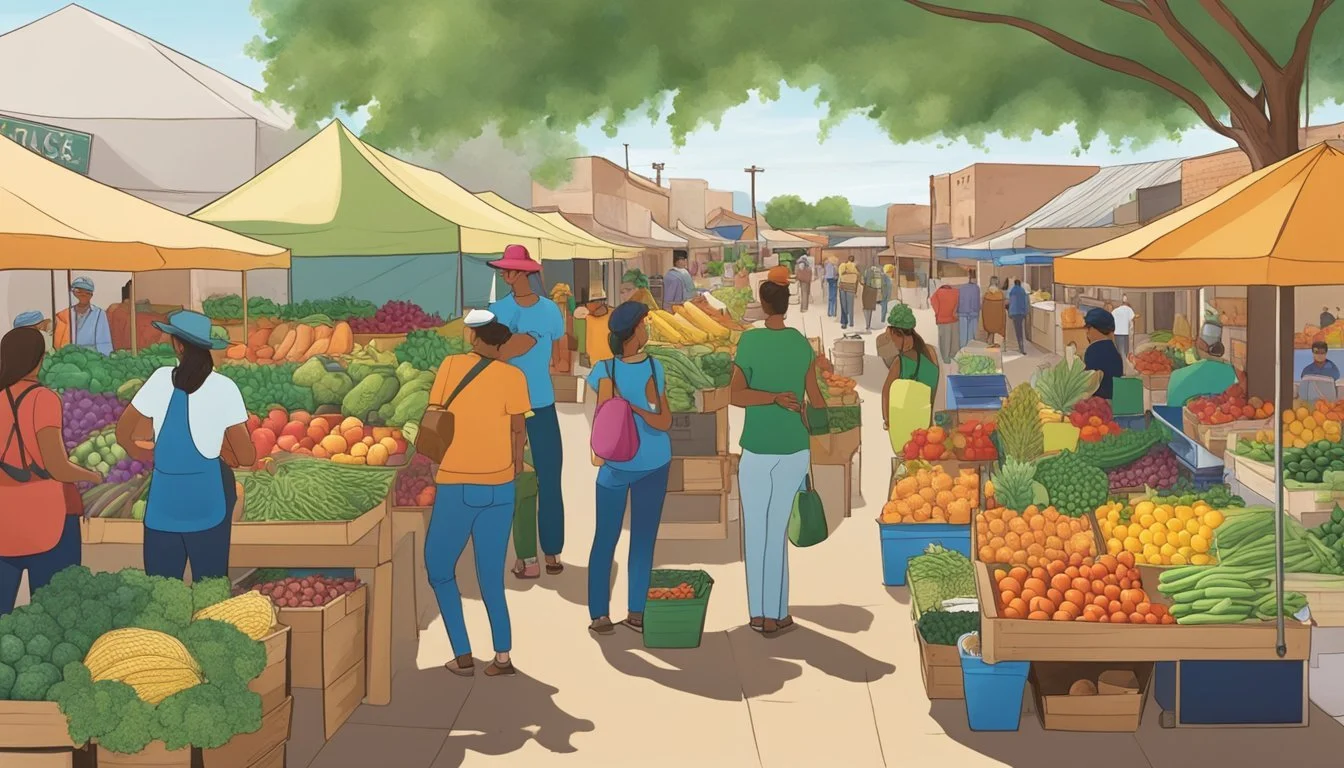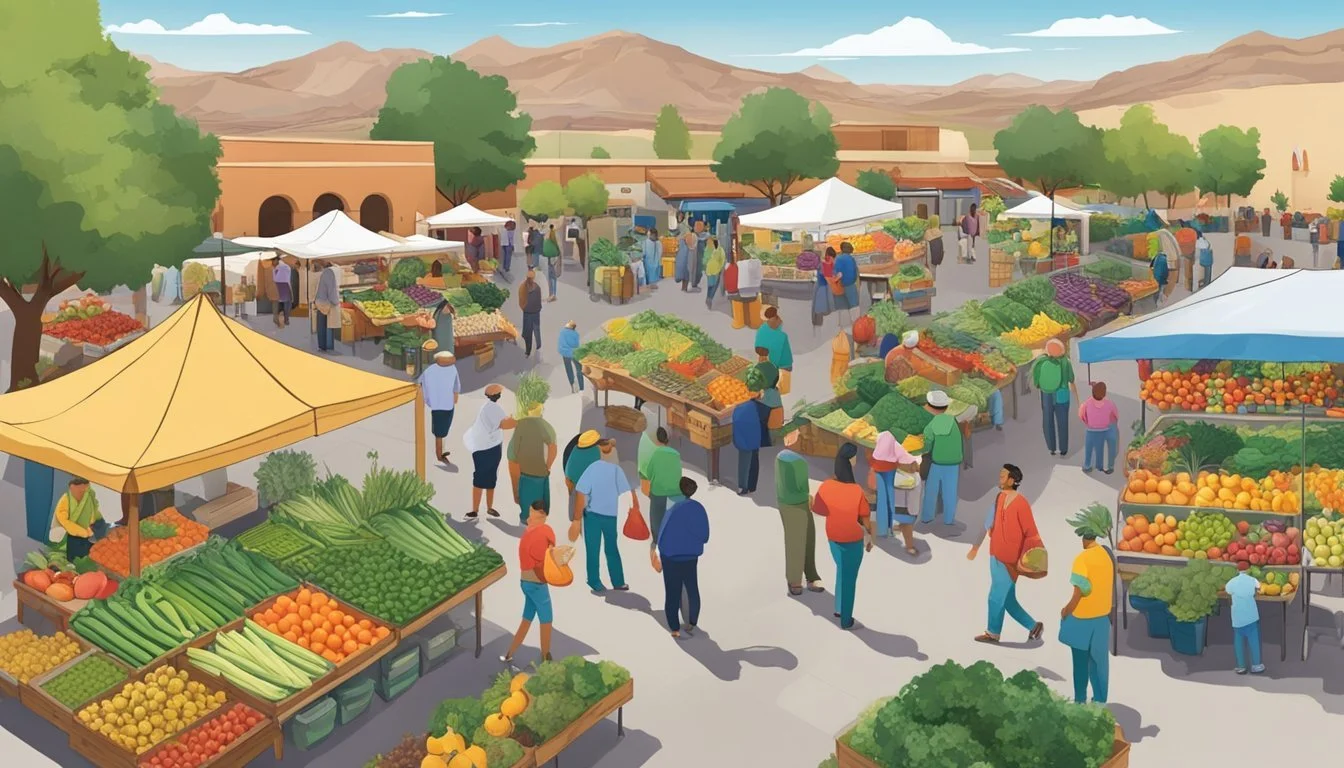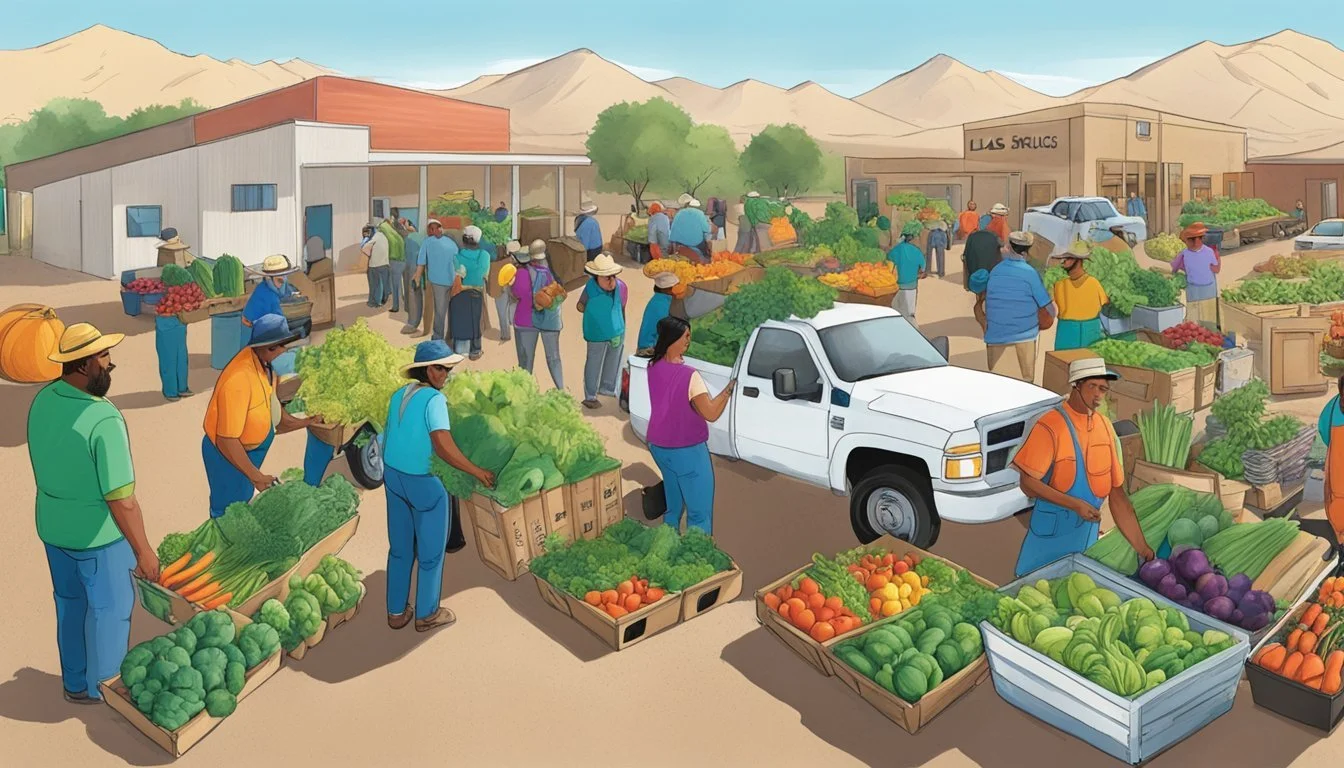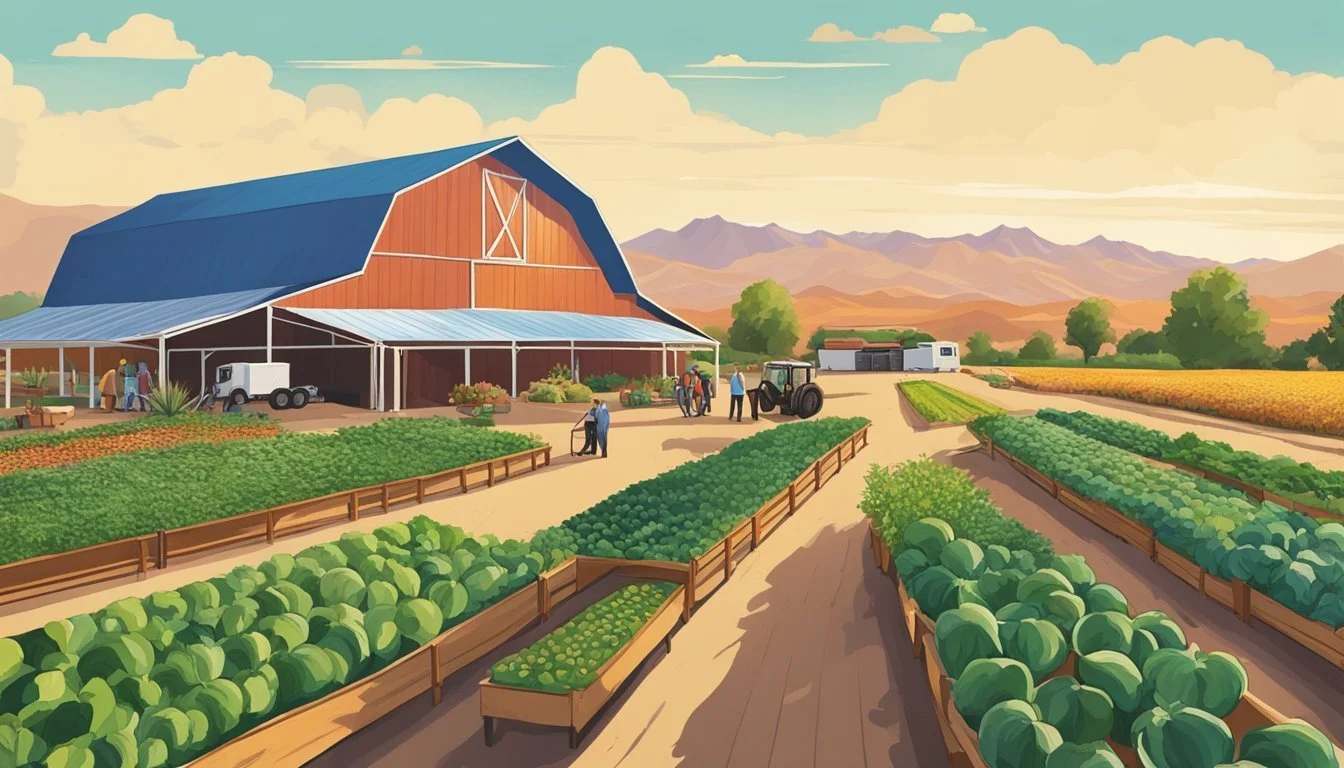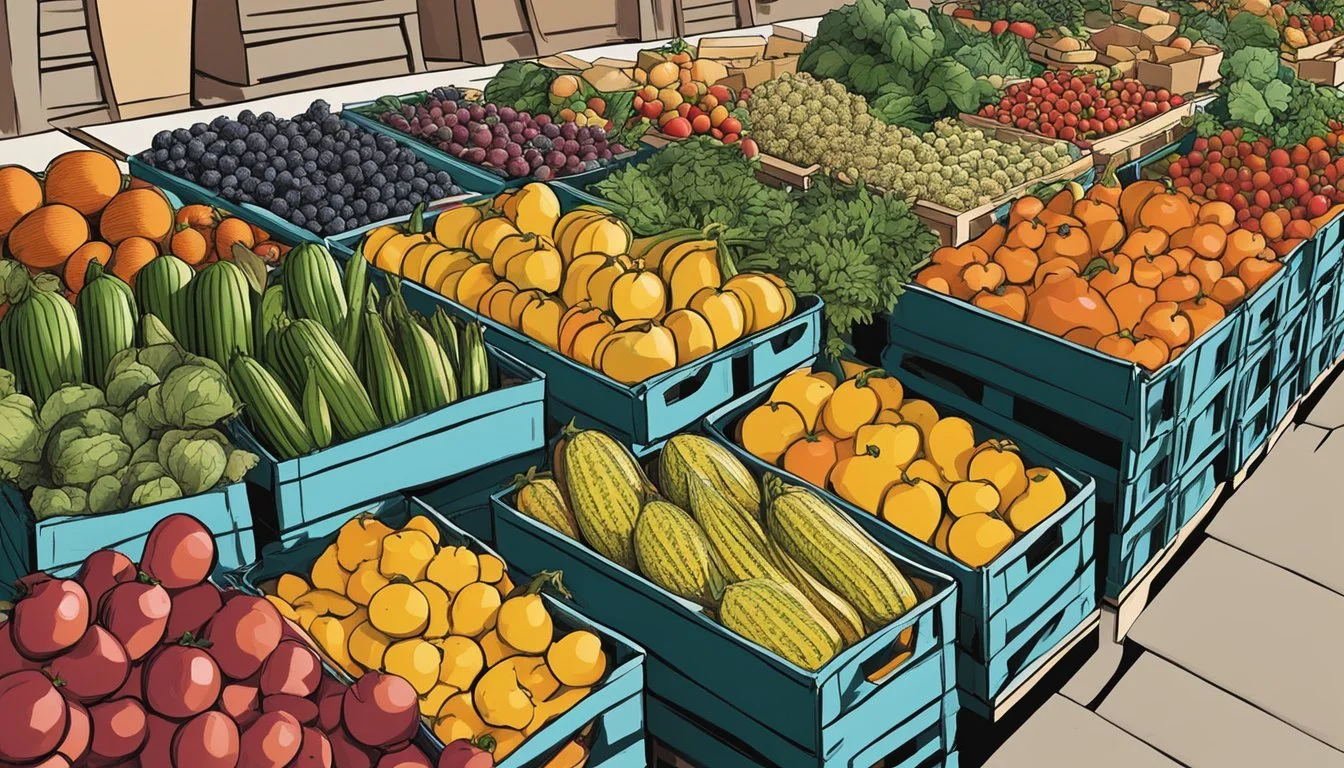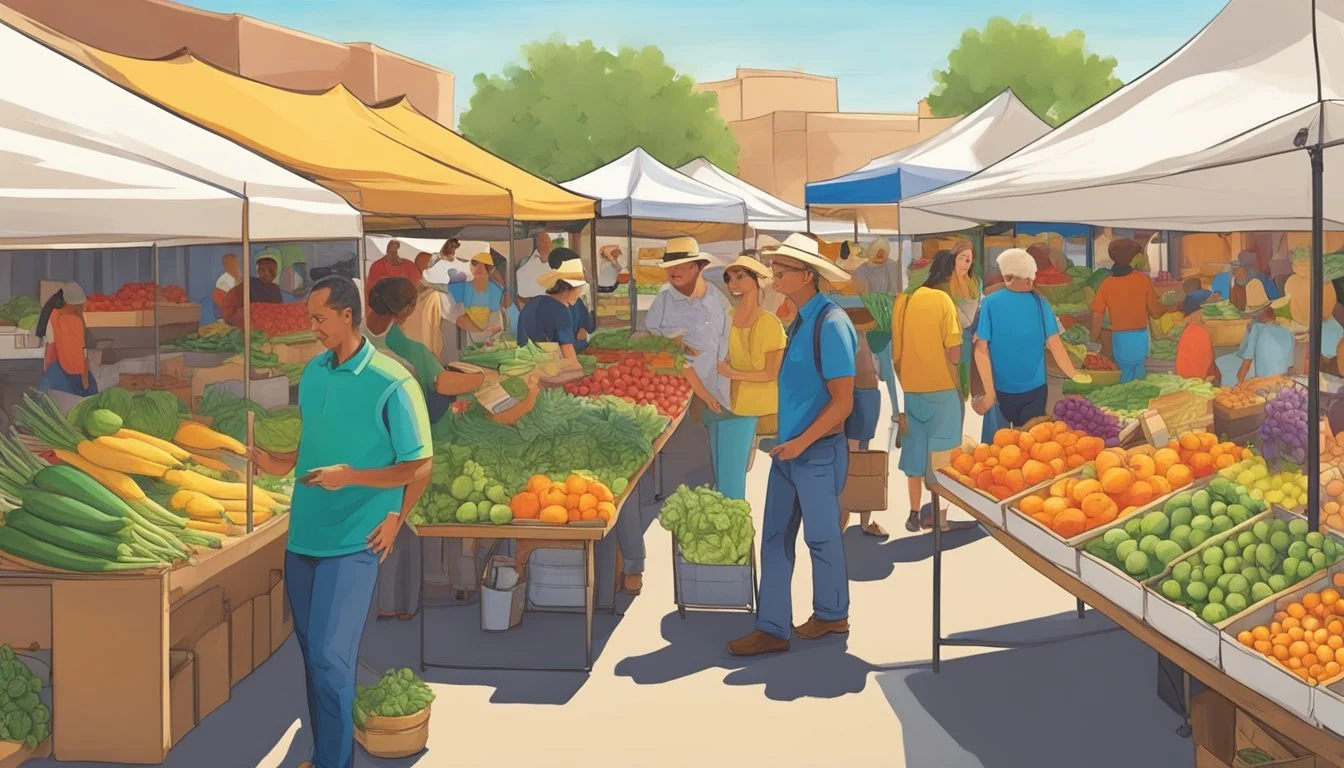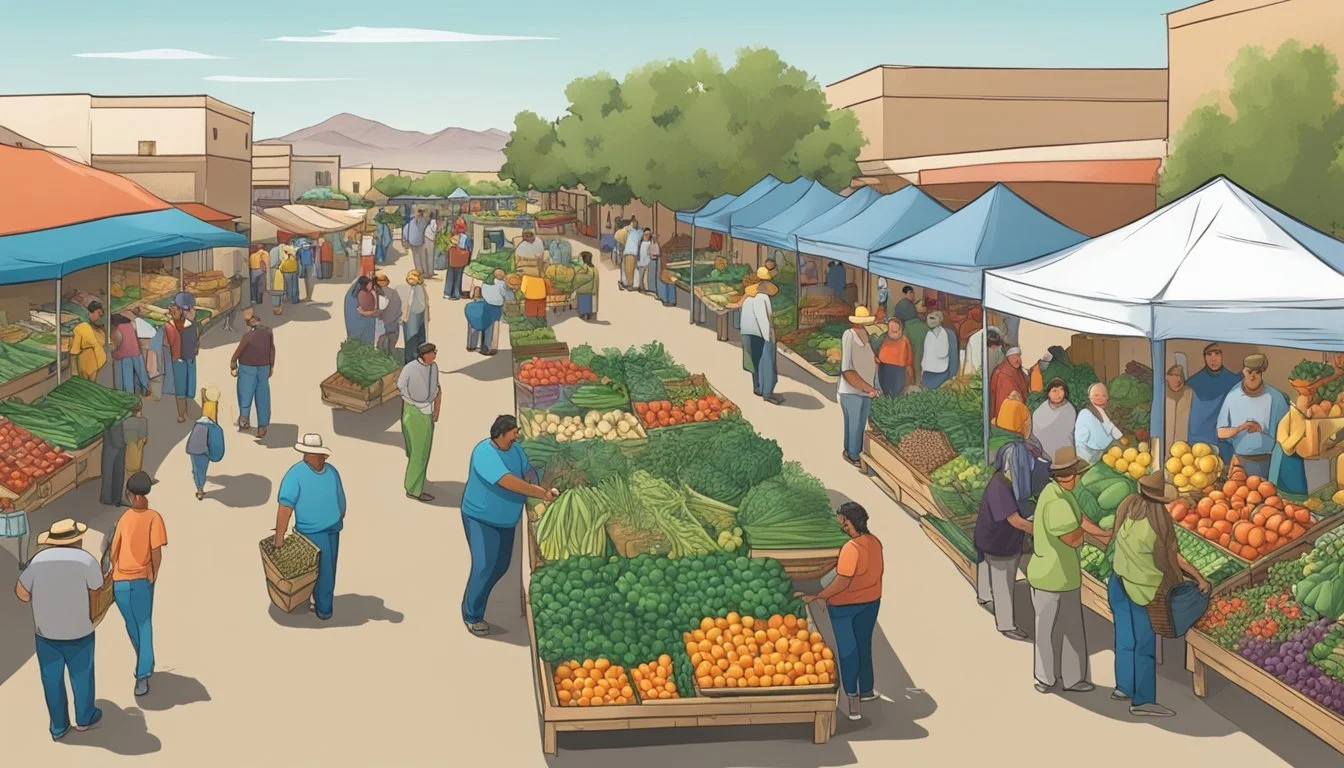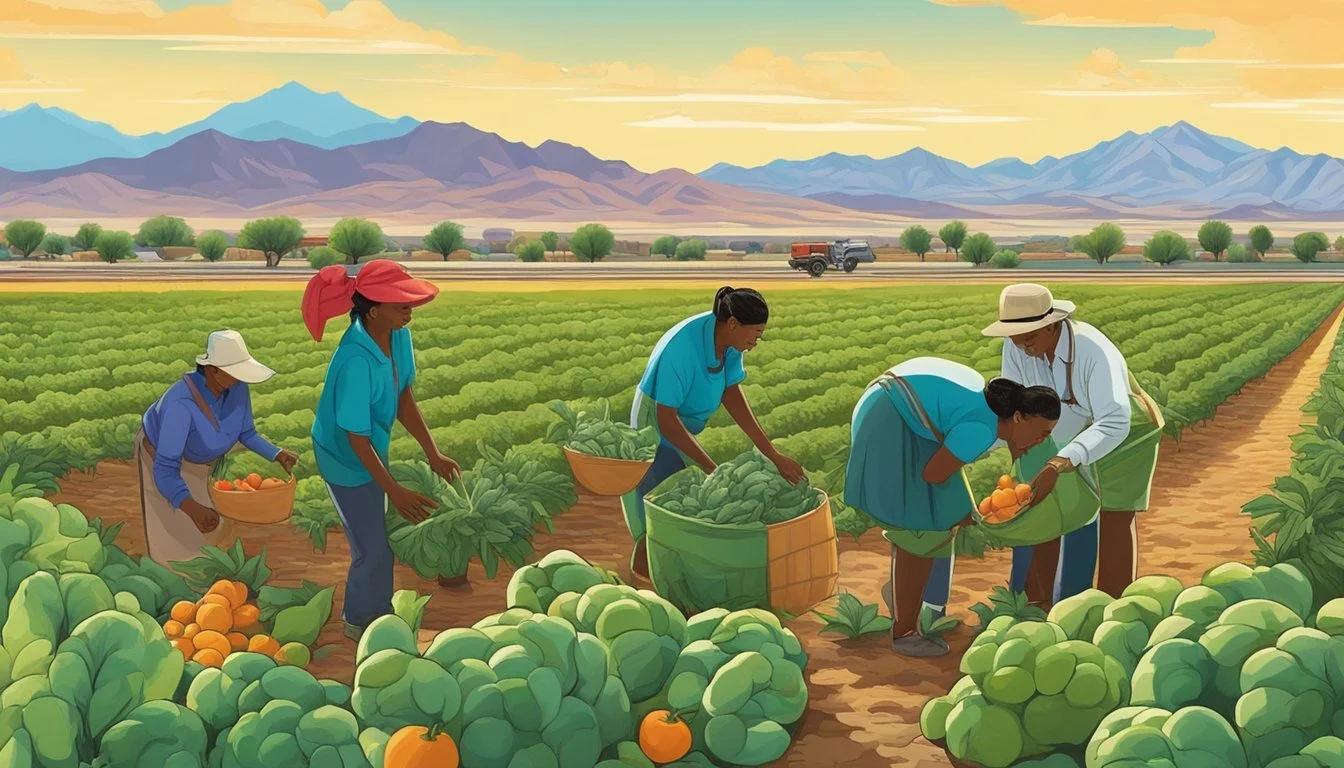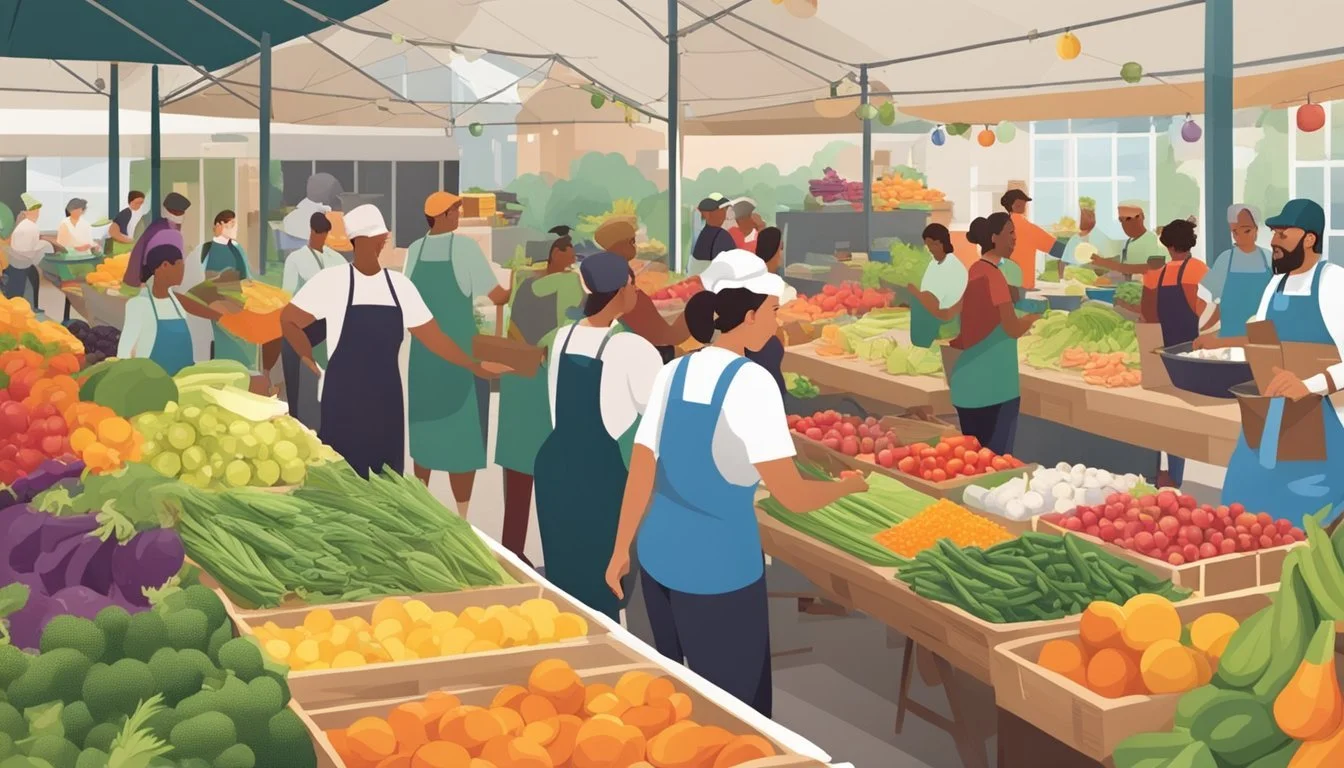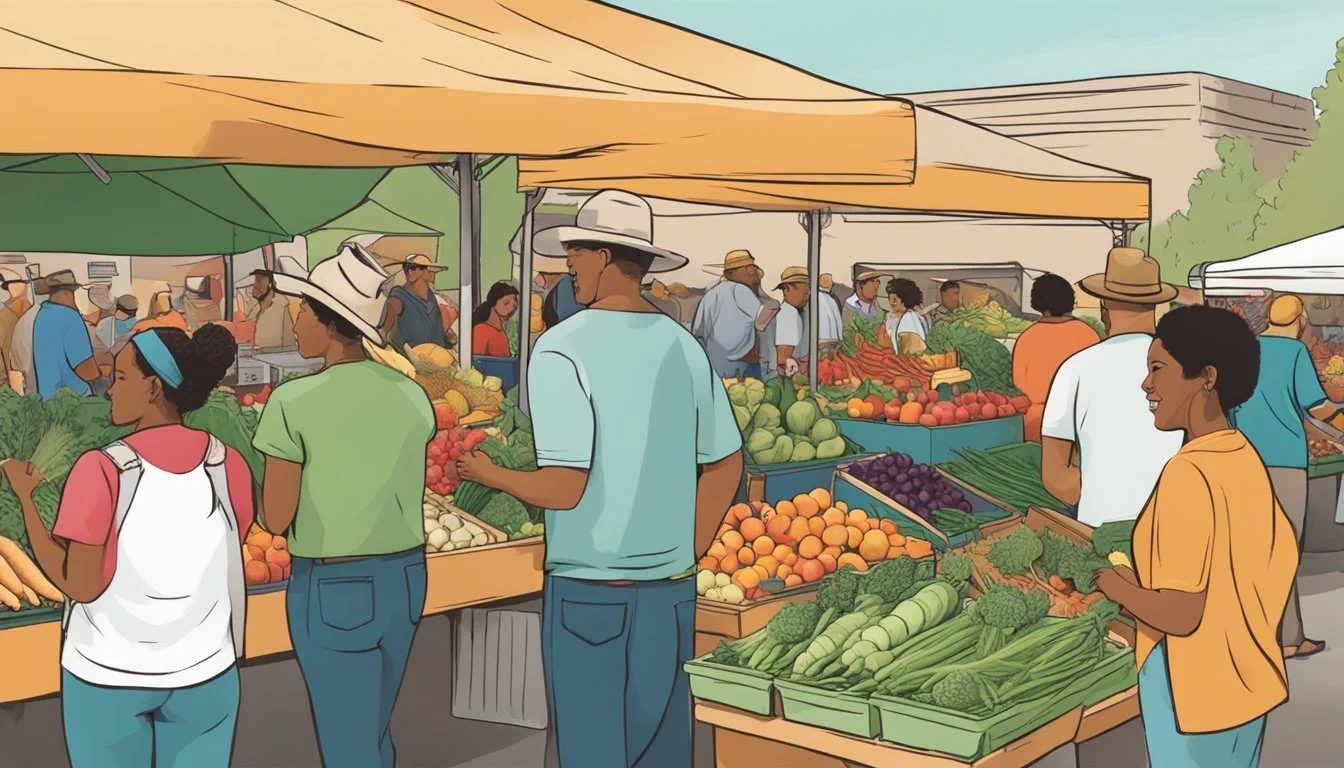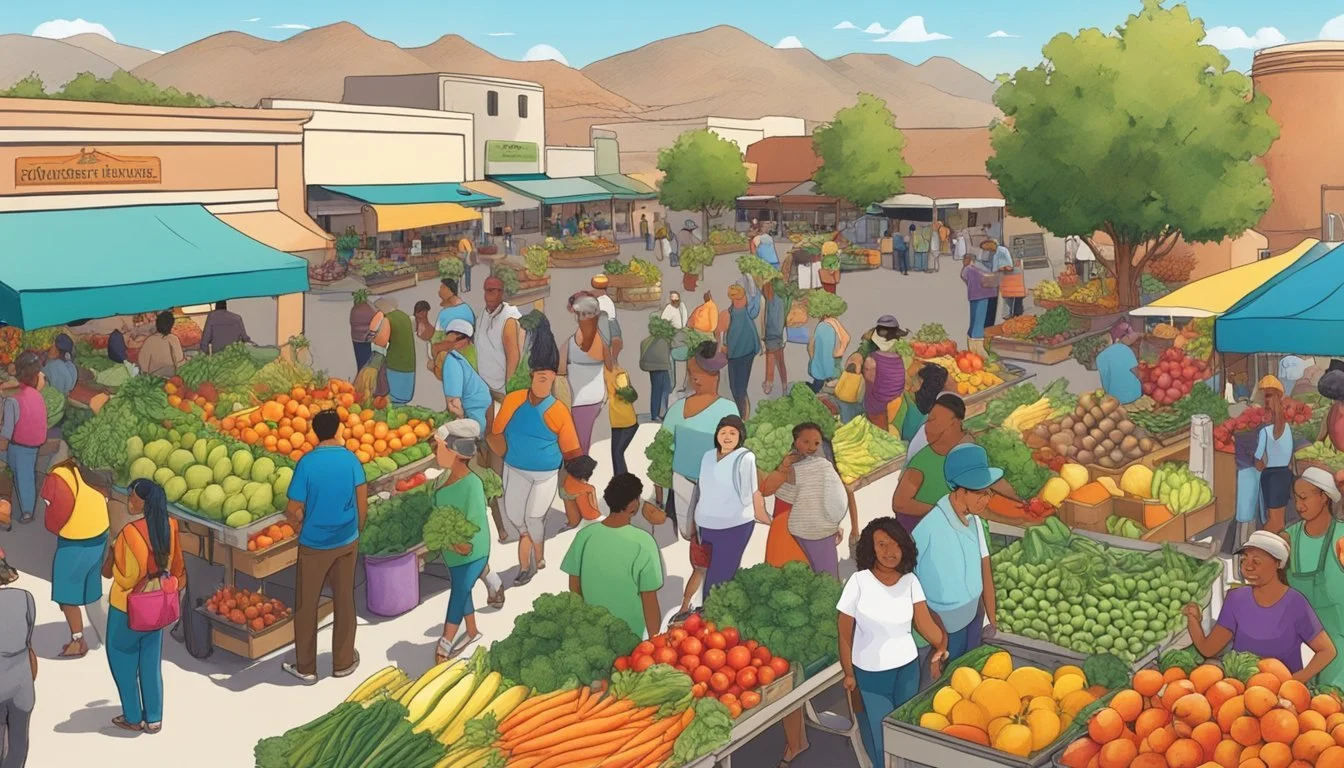Community Supported Agriculture (CSA) in Las Cruces, NM
A Guide to Local Farm Partnerships
Community Supported Agriculture, commonly known as CSA, has taken root in Las Cruces, New Mexico, offering a model of food production and distribution that directly connects producers and consumers. In this system, individuals purchase shares from local farms at the start of the growing season. This financial support provides farmers with the necessary capital for their operations, and in return, shareholders receive a weekly supply of fresh, locally grown produce throughout the harvest period.
Las Cruces has witnessed a rising interest in CSAs due to the region’s fertile lands and conducive growing climate. The movement supports the local economy and promotes sustainable agricultural practices. CSA members in the area benefit from a diverse array of fresh produce, which often includes unique varieties not commonly found in grocery stores. Additionally, CSAs such as the Desert Micro LLC offer year-round availability of specific items like microgreens, demonstrating the adaptability of these programs to the local climate and consumer demand.
The engagement of consumers with CSAs in Las Cruces extends beyond just monetary transactions. It represents a commitment to healthier lifestyles, the environment, and the preservation of local farming communities. Through this partnership, residents have the opportunity to directly impact the success of local agriculture, while enjoying the tangible benefits of fresh, nutritious food on their tables.
Understanding CSAs
This section provides an in-depth look at Community Supported Agriculture (CSA), specifically its concept and origins. Readers will gain an understanding of how CSAs function and their historical context within the community.
What is CSA?
Community Supported Agriculture (CSA) is a model where individuals buy "shares" of a farm’s harvest in advance. In return, they receive regular distributions of the farm's produce throughout the growing season. This symbiotic relationship allows farmers in Las Cruces, NM to procure the necessary upfront capital for their farming operations while offering consumers fresh, locally-produced food on a weekly basis. The structure of CSAs can vary, but they generally foster a closer relationship between farmer and consumer.
Benefits for consumers:
Exposure to new varieties of fruits and vegetables
Direct support of local agriculture
Benefits for farmers:
Upfront capital for the season
Stronger connection with community
A guaranteed market for their produce
History of CSA
The CSA model has its roots in the early cooperative movements of Europe and Japan. The concept was introduced in the United States in the 1980s. It was seen as a method to counteract the growing disconnection between consumers and the sources of their food. It also provided an alternative to the pressures of commercial agriculture, allowing small farms to thrive and maintain sustainable practices.
Key developments:
Imported to the U.S. in the 1980s
Inspired by European and Japanese agricultural cooperatives
Aligns with sustainable farming and direct marketing movements
By understanding the fundamentals and history of CSA, individuals can appreciate the pivotal role it plays in supporting local farmers and strengthening the ties between food production and community.
CSA Benefits and Challenges
This section outlines tangible benefits that CSA models provide to consumers and farmers in Las Cruces, NM, while also addressing the inherent risks involved in this system of agriculture.
Advantages for Consumers
Consumers benefit from CSAs because they gain access to fresh, local produce often at a cost lower than retail prices. CSA members invest in shares of the farm's harvest, supporting local farmers while receiving a weekly or bi-weekly box of assorted veggies and other farm products. This system fosters community by linking consumers with their food sources and providing them with seasonal specialties.
Variety: A diverse array of produce with each share, often including items not commonly found in supermarkets.
Freshness: Produce that is fresher than store-bought, as it's typically distributed within a day or two of harvest.
Advantages for Farmers
Farmers operating a CSA benefit from a more predictable income stream, as shares are typically purchased by consumers at the start of the growing season. This early capital allows for better financial planning and reduced risks associated with market fluctuations.
Financial Security: Upfront payment for season's shares aids in budgeting for seeds, equipment, and labor.
Direct Market: Farmers build a dedicated customer base, alleviating the need to compete in traditional markets.
Potential Risks
Despite its advantages, CSA models carry risks for both consumers and farmers. Consumers face the possibility of smaller produce yields due to factors outside the farmers' control, like adverse weather or pest infestations. Meanwhile, farmers must manage the expectations and varied preferences of a diverse membership base, which can be challenging.
Weather Dependency: Crop yield can vary significantly due to weather conditions, impacting share sizes.
Diversity of Preferences: Balancing produce selection to meet the tastes of all members can be complex.
CSA Operations in Las Cruces
In Las Cruces, NM, Community Supported Agriculture programs establish a seasonal, subscription-based relationship between consumers and local food producers, promoting a shareholding membership structure.
How CSAs Work
Community Supported Agriculture (CSA) in Las Cruces involves consumers purchasing a "share" at the start of the growing season. This financial commitment upfront allows farmers to plan their crop rotations and secure necessary capital for the season. Shareholders then receive a portion of the farm's harvest on a regular basis, typically weekly. This model fosters direct support and engagement between the community and local farms.
Local CSA Examples
Local CSA initiatives in Las Cruces include operations like Desert Micro LLC, which specializes in a variety of microgreens, baby greens, and vegetables. Their produce is available year-round, with a brief pause during mid-December to mid-January. New Mexico Harvest, another prominent CSA, showcases a network of nearly 80 farmers and food producers spanning the state, indicating a large-scale commitment to CSA principles.
Seasonal Variations
Seasonal changes affect CSA operations, dictating the availability and variety of produce. Summer and fall typically offer a bounty of vegetables and fruits, while the winter months may focus on hardier greens and root vegetables. The shareholders in Las Cruces understand that their subscription can reflect the region's growing seasons, with assortments varying to accommodate the natural cycles of agriculture.
Agriculture in New Mexico
New Mexico's agriculture is characterized by its unique climate and innovative farming practices, such as Community Supported Agriculture (CSA) models that connect consumers with local growers.
Climate and Crops
New Mexico's climate presents both challenges and opportunities for agriculture. The state experiences a semi-arid to arid climate, with hot summers and mild winters, which greatly influences the type of crops that can thrive. Scarce water resources necessitate efficient irrigation techniques and contribute to the prominence of drought-resistant crops. Primary crops in New Mexico include chile peppers, pecans, onions, and various fruits and vegetables suitable for the local conditions. Organic farmers work diligently to optimize the use of the soil while minimizing water wastage and refraining from synthetic pesticides.
Major Crops Grown in New Mexico:
Chile peppers
Pecans
Onions
Cotton
Dairy products
CSA Farming Practices
CSA farming represents a symbiotic relationship between local farms and community members in New Mexico. These practices emphasize shared risk and rewards where consumers purchase "shares" from organic farmers, such as Desert Micro LLC in Las Cruces, NM, ensuring access to fresh, seasonal produce while providing farmers with upfront capital. This directly supports the agricultural community by funneling resources into local operations that focus on sustainable and regenerative techniques to maintain soil health and reduce the environmental footprint.
Key Elements of CSA Farming in New Mexico:
Upfront purchase of shares by consumers
Weekly supply of fresh produce to share-holding members
Emphasis on sustainable and organic farming practices
Direct support of local food systems and farmers
Joining a CSA in Las Cruces
Joining a Community Supported Agriculture (CSA) program in Las Cruces, NM, allows individuals to become shareholders and receive a portion of local farm produce regularly. This model supports local agriculture and offers fresh, seasonal produce to residents.
How to Become a Member
To become a CSA member in Las Cruces, individuals should contact local farms early in the season as memberships are often limited. Interested parties can find CSA options through resources such as the New Mexico Farmers' Marketing Association or LocalHarvest. They typically must fill out a membership form and pay for their subscription, which secures their share of the harvest.
Exploring Membership Options
Membership options in Las Cruces vary from farm to farm. Some CSAs may offer different sizes of produce shares, add-ons like dairy or eggs, and even specialized shares geared towards smaller households or those with specific dietary preferences. Individuals can explore offerings from local farms like Desert Micro LLC to find a plan that fits their needs.
What to Expect
As a shareholder, one can expect a weekly or bi-weekly box of fresh produce during the farming season. The types and quantities of produce will vary based on what's in season and the farm's current harvest. Memberships typically run from the start of the growing season through to the end, and members are encouraged to understand the seasonal nature of their subscriptions.
Local Food Systems
Community Supported Agriculture in Las Cruces, NM reflects a robust partnership between local food producers and the community, leading to a resilient local food system that bolsters the Las Cruces economy.
Local Farming Communities
The fabric of Las Cruces' local farming communities is woven through initiatives like CSA, where consumers directly support local farmers. This supportive network is made tangible through farmers markets and farm stands, where the community can access fresh, locally-grown produce. Farms in the area extend their reach by participating in CSAs, ensuring a stable market for their products while providing residents with real food grown within their own region.
Impact on Las Cruces Economy
Investing in local CSAs has a multiplier effect on the Las Cruces economy. When consumers purchase shares from local CSAs, their money directly funds agricultural operations, which in turn circulate more capital within the local economy. Farms that operate year-round, like Squash Blossom Local Food, contribute to a sustainable economic model, exemplifying how a values-based approach to food can reinforce economic stability. By linking consumers with producers, the overall economic impact is felt in job creation, the strengthening of local supply chains, and community resilience against external market shocks.
Supporting CSA Initiatives
Community Supported Agriculture in Las Cruces, NM, thrives on direct support from residents. Local citizens have the opportunity to strengthen the agricultural fabric of their community through dedicated involvement.
Volunteering Opportunities
Community members can bolster CSA efforts by offering their time and skills as volunteers. Many local farms in Las Cruces, NM, such as Desert Micro LLC, benefit from volunteer work, especially during the peak growing and harvest seasons. Volunteers may assist with planting, weeding, harvesting, and packaging produce. This support is crucial as it alleviates labor demands on farmers and fosters a deeper connection between the community and the food they consume.
Planting: Help prepare seedbeds and plant various crops.
Weeding: Aid in maintaining the fields to promote healthy growth.
Harvesting: Gather crops when they are ripe and ready.
Packaging: Assist in sorting and distributing shares to members.
Community Engagement
Community engagement is vital in nourishing relationships between local farmers and consumers. Participation in CSA programs, such as purchasing shares from farms like Cluck It Farm Las Vegas (which operates on a season beginning January 15, 2024), translates into financial support that helps secure the capital needed for a successful season. This type of engagement demonstrates a commitment to local producers and sustains the local food system by ensuring that farmers have the resources to grow and distribute food effectively.
Buying Shares: Secure weekly produce boxes and invest in the farm's future.
Educational Events: Attend workshops and tours to learn about sustainable agriculture.
Regular Communication: Maintain contact with farmers for updates and feedback.
Word-of-Mouth: Promote CSA programs within the community to grow member numbers.
Direct Sales and Markets
Las Cruces, NM, offers a robust selection of direct sales opportunities through various farmers markets, enabling consumers to purchase fresh produce, eggs, and meat directly from the source. Enhanced by farm visits and tours, these markets provide an intimate look at local agriculture.
Farmers Markets in Las Cruces
The Las Cruces Farmers & Crafts Market stands as a pillar in local agriculture commerce, operating year-round on Wednesdays and Saturdays. It is one of the prime spots for residents and visitors alike to indulge in the freshest local produce, vibrant eggs, and artisanal meats that the region has to offer. This market, located in historic downtown Las Cruces, is noted for its longstanding presence and commitment to fostering direct consumer to farmer transactions.
Days Open: Wednesdays and Saturdays
Location: Historic downtown Las Cruces
Products Available: Fresh local produce, eggs, meats
Farm Visits and Tours
For those interested in diving deeper into where their food comes from, some local farms around Las Cruces encourage the community to visit the farm. These visits often educate attendees on sustainable farming practices, provide insights into regenerative agriculture, and offer the opportunity to purchase produce straight from the source. Farms such as the CSA-operated Desert Micro specialize in microgreens, edible flowers, and wheatgrass, and welcome the public to experience agriculture up close.
Farm Visit Opportunities: Education on sustainable practices, purchase produce
Specializations: Microgreens, edible flowers, wheatgrass (Desert Micro)
Educational Resources and Programs
In Las Cruces, NM, individuals seeking to learn about Community Supported Agriculture have access to a variety of educational resources and programs. These are designed to enhance knowledge of CSA practices and sustainable agriculture, benefiting both consumers and producers.
Workshops and Courses
The New Mexico Farmers' Marketing Association offers workshops aimed at connecting consumers with local CSA producers. They emphasize the importance of "shares", a method where consumers financially support farms early in the season and receive weekly produce boxes.
Furthermore, AgriFuture, an initiative by New Mexico State University, provides resources and educational programs for aspiring and current farmers, including information on subscription food box companies and CSAs as a part of its commitment to foster agricultural knowledge.
LocalHarvest serves as an online hub for finding CSA programs and may offer web-based learning tools and community engagement methods for those interested in CSA participation.
Agricultural Extensions
New Mexico State University's Agricultural Extension Office:
Provides research-based knowledge and programs to assist in agricultural endeavors.
Address: 1050 Stewart Street Las Cruces, NM 88003
Phone: (575) 646-3007
Operating Hours: Monday - Friday, 8:00 a.m. - 5:00 p.m (Closed for lunch from 12:00 p.m. to 1:00 p.m.).
Extensions offer guidance that aligns with the U.S. Department of Agriculture's (USDA) standards and practices, ensuring that communities benefit from government-supported research and resources. The agricultural extension office makes significant contributions by disseminating pivotal information to both local farmers and consumers interested in the CSA model.
Regional CSA Networks
Community Supported Agriculture (CSA) in Las Cruces and its neighboring regions has established a robust network connecting consumers with local food producers. These networks facilitate the direct sale of farm shares and seasonal produce, anchored by a commitment to community and sustainability.
New Mexico and Surrounding Areas
The CSA landscape in New Mexico, particularly in regions like Las Cruces, Mesilla, and Doña Ana County, is typified by networks that offer an array of fresh, locally grown foods to community members. In Las Cruces, consumers can engage with CSAs through various farms which commonly offer weekly produce boxes in exchange for a seasonal membership fee.
Albuquerque and Santa Fe, larger cities within the state, also support a multitude of CSA programs, reflecting a statewide movement towards locally-sourced food. Local food enthusiasts in Las Cruces have the opportunity to enjoy offerings from a network that includes nearly 80 farmers and food producers from across New Mexico.
Close to the state border, El Paso, Texas is within the reach of these networks, reinforcing the regional ecosystem of CSA providers and fostering cross-state relationships that benefit consumers and farmers alike.
Local Impact: CSA networks significantly support the local economies, enhance community health, and reduce the carbon footprint associated with long-distance food transportation.
Consumer Education: They also play an educational role by increasing awareness about sustainable agriculture and the importance of supporting local food systems.
The CSA framework in Las Cruces and the broader region exemplifies an effective model of food distribution that champions freshness, locality, and seasonality, contributing to a thriving local food culture.
Sustainability and Organic Practices
Community Supported Agriculture (CSA) in Las Cruces, NM, focuses on connecting consumers with locally-grown, sustainably produced food. Emphasizing environmental health, CSA's often adopt organic certifications and sustainable farming methods to ensure long-term viability of agriculture in the region.
Organic Certifications
Organic farmers in Las Cruces are committed to maintaining soil quality and biodiversity by avoiding synthetic pesticides and fertilizers. Certification involves strict adherence to organic farming practices that are verified regularly to ensure consumers receive genuinely organic produce. For instance, Jay Valencia, a regenerative farmer, provides premium organic microgreens to Las Cruces, highlighting the community's dedication to organic produce.
Sustainable Farming Methods
Sustainability is at the core of CSA operations in Las Cruces. Farms implement a variety of farming methods that conserve water, build soil health, and reduce carbon emissions. Here are key sustainable practices used:
Crop Rotation: Enhancing soil nutrients and interrupting pest cycles.
Cover Crops: Protecting against erosion and replenishing soil fertility.
Conservation Tillage: Reducing soil disruption, conserving moisture, and supporting beneficial organisms.
Water Management: Utilizing drip irrigation and other techniques to optimize water use.
By integrating these practices, local CSAs demonstrate their commitment to the environment and the wellbeing of future generations.
Product Variety and Selection
In Las Cruces, NM, Community Supported Agriculture (CSA) programs offer a diverse range of locally-grown options. Shareholders can expect a wide variety of fresh produce alongside an array of non-produce goods, meeting most seasonal dietary preferences and needs.
Seasonal Produce Choices
CSA members can relish a rotation of seasonal produce that often includes a selection of vegetables and fruit cultivated in the region's prime growing conditions. For instance, they might receive:
Spring: tender lettuce, spinach, and aromatic herbs
Summer: juicy tomatoes, crisp cucumbers, and sweet peaches
Autumn: robust squash, earthy root vegetables, and tart apples
This cyclical selection ensures that shareholders enjoy the freshest and most flavorsome produce available.
Non-Produce Offerings
While fresh produce is the cornerstone of CSAs, Las Cruces' CSAs may bolster their shares with additional farm products. These can include:
Fresh-cut flowers to brighten up dining tables
Mushrooms, offering a gourmet touch to weekly meals
Handcrafted herbal products that bring the essence of the farm into homes
These offerings contribute to a well-rounded CSA experience, supporting a truly local and sustainable food system in Las Cruces.
Consumer Tips and Considerations
When joining a Community Supported Agriculture (CSA) program in Las Cruces, NM, consumers should carefully consider their options and understand how to navigate the CSA landscape. It is important to establish a positive relationship with the community and manage expectations to ensure a satisfactory experience.
Evaluating CSA Programs
Research the Farms: Consumers should investigate the history and practices of the farms offering CSA shares. They may look for organic certifications or inquire about the farm's regenerative agriculture methods to ensure the produce meets their standards.
Verify Share Details: Before committing, consumers should understand precisely what is included in each share and over what period. Share components, including variety and volume of produce, can vary considerably between farms.
Communication Expectations: Establish clear lines of communication. Consumers should know how and when the farm communicates, for instance, weekly newsletters or updates about what to expect in their next delivery.
Handling Complaints
Direct Resolution: If a consumer encounters an issue with their CSA share, the first step should always be to contact the farm directly. A respectful and direct conversation can often quickly resolve any concerns.
Document the Issue: Keeping a record of the complaint and any correspondence can be helpful, especially if the problem persists.
Community Support: If resolutions are not forthcoming, consumers may seek advice or aid from the local CSA community. Other members may have had similar experiences and can offer guidance on effectively addressing the problem.
Economic Aspects of CSAs
Community Supported Agriculture in Las Cruces, New Mexico, presents a model of agriculture that hinges on consumer investment and commitment, offering both financial support to local producers and a stake in the local food economy.
Cost Analysis
In Las Cruces, community members can purchase shares of a farm's projected harvest, which requires consumers to pay upfront. This initial investment varies depending on the farm but typically covers a season’s worth of produce. Financially, this upfront payment method helps farms by providing them with capital at the beginning of the growing season, which can be used to offset the costs of seeds, equipment, and labor. From the consumer's perspective, while the initial cost may be substantial, the overall season-long expenses on produce typically align with market prices. Moreover, members often receive a diverse array of fresh produce weekly, which may lead to a reduction in grocery bills over time.
Example of Cost Breakdown for CSA Shares in Las Cruces:
Upfront Cost: $200 - $500 per season
Season Length: Approximately 25 weeks
Weekly Value: $8 - $20 of produce
Community Investment
The CSA model in Las Cruces goes beyond the financial transaction of purchasing food; it is an investment in the community's agricultural vitality and sustainability. Shareholders are directly supporting local agriculture and ensuring that farmers receive a fair price for their labor and produce. This model creates a form of partnership where both farmer and consumer have a vested interest in the success of the farm. Additionally, this investment circulates money within the local economy, leading to more robust economic health and job creation in the agricultural sector. By committing to a CSA, members underpin a system where local food production is valued and sustained.
Benefits of Community Investment through CSAs:
Direct support to farmers' livelihoods
Stimulation of the local food economy
Promotion of job creation in agricultural sectors
Food Security and Access
Community Supported Agriculture (CSA) programs in Las Cruces, NM, enhance food security by connecting consumers directly with local farmers. They play a pivotal role in ensuring access to fresh, nutritious food within the community.
CSAs and Food Banks
CSAs in Las Cruces not only support local agriculture but also contribute to food banks. They provide a steady stream of wholesome food choices, fundamentally improving the health and wellbeing of residents who rely on food assistance. Desert Micro, for instance, operates year-round, offering products like microgreens and edible flowers, thus diversifying the dietary options available to underprivileged community members.
Local food producers occasionally partner with food banks to distribute parts of their harvest. By doing so, they help close the food security gap. This symbiotic relationship between CSAs and food banks bolsters the availability of organic and healthy food options.
These collaborations are sustained through initiatives such as the Squash Blossom Local Food which operates all year. It actively works with local food producers to supply locally sourced, seasonal food to the community, including those in need, emphasizing support and strengthening health through better food options.
By centering on local food systems, CSAs demonstrate effective community support, providing a safety net that ensures no member of the Las Cruces community lacks access to essential food resources.
Preservation and Cooking
In Las Cruces, NM, Community Supported Agriculture provides a bounty of fresh produce that can be preserved for longevity or used creatively in cooking. The methods discussed here ensure that individuals can enjoy their CSA vegetables, like winter squash, throughout the seasons.
Preserving CSA Goods
One can preserve vegetables through various techniques such as canning, pickling, freezing, and drying. Winter squash, a common CSA item, is well-suited for long-term storage without immediate preservation — it can last several months if kept in a cool, dry place. For other vegetables, they might consider:
Canning: A method suited for high-acid foods like tomatoes. Vegetables can be stored safely for up to a year when processed correctly.
Pickling: Great for cucumbers, carrots, and other crunchy veggies. The high acidity of the pickling solution prevents bacterial growth.
Freezing: Many vegetables must be blanched before freezing to preserve texture and color.
Drying: Works well for herbs and some hearty vegetables; it concentrates flavors and makes for easy storage.
Cooking with CSA Ingredients
Cooking with fresh CSA produce like winter squash involves simple yet thoughtful preparation to highlight the natural flavors. Here are a couple of straightforward suggestions:
Roasting: Enhances sweetness and gives a beautiful caramelization. Cut the winter squash into uniform pieces, toss with olive oil, and season before roasting.
Soup-Making: A warming way to make use of a variety of vegetables. Start with mirepoix (chopped onions, carrots, and celery), add stock or water, then incorporate your CSA vegetables and let everything simmer until deliciously tender.
By employing these preserving and cooking practices, CSA members can maximize their share and enjoy homegrown flavors all year round.
Community and Cultural Impact
Community Supported Agriculture (CSA) in Las Cruces, NM, has fostered a deep integration between local food systems and cultural heritage, particularly through the indigenous practices that contribute significantly to the CSA model's success.
Indigenous Influence and Practices
The impact of indigenous communities on CSA in Las Cruces cannot be overstated. Indigenous groups have long utilized sustainable farming practices and have a profound influence on local agriculture. They employ time-honored techniques which are inherently sustainable and community-oriented.
Local CSAs often incorporate traditional methods of planting, harvesting, and irrigating that have been passed down through generations. One example is the use of acequias - communal watercourses - which represent both a practical irrigation method and a symbol of community cooperation. The acequias are integral to the preservation of both agricultural and cultural traditions in the area.
By incorporating these indigenous practices, CSAs in Las Cruces cement their role not just as food suppliers but also as protectors and proliferators of cultural heritage. The collaboration between CSA members and farmers strengthens community bonds, promoting a shared commitment to cultural sustenance and land stewardship.
The participation of local communities is crucial for CSAs as they rely on a system of shared investment in local food production. In Las Cruces, this involvement goes beyond the exchange of goods; it's a form of cultural continuation. Customers are not just buying produce; they're investing in a cultural system that honors the agrarian heritage of the region.
Conclusion
Community Supported Agriculture (CSA) represents a significant stride toward sustainable farming and consumer engagement in Las Cruces, NM. Through the CSA model, consumers in this region have direct access to fresh, locally-produced food. They become shareholders in the agriculture process, receiving a weekly share of the harvest, which fosters a connection to the land and the people who cultivate it.
CSAs in Las Cruces contribute to a robust local food system that supports not only consumer health but also the economic and environmental well-being of the community. This model empowers local farmers, allowing them to secure necessary capital at the beginning of the season, which in turn, provides stability and can lead to innovations in sustainable farming practices.
The presence of CSA in Las Cruces also upholds the city’s agricultural heritage, bridging the past and future of farming. As shareholders receive their weekly produce, they partake in a tradition that values community and shared responsibility for food resources.
In summary, Community Supported Agriculture in Las Cruces stands as a testament to the strength and potential of community-based food systems. It demonstrates how local commitment can yield a healthier, more connected, and sustainable way of life.
Benefits of CSA in Las Cruces, NM - Direct access to fresh produce - Support for local farmers and economy - Enhancement of consumer-farmer relationships - Encouragement of sustainable agricultural practices

